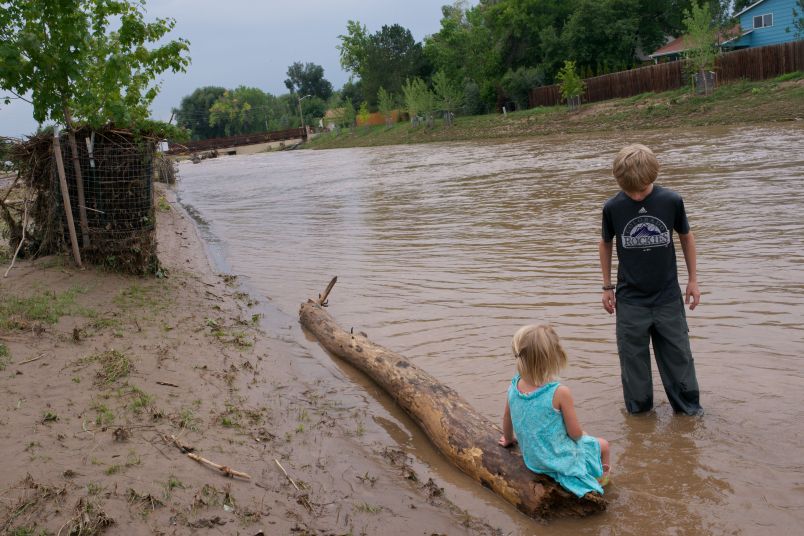This is a national emergency.
As I walked through the neighborhoods in Boulder, Colorado several weeks ago, navigating streets that had first become creeks and then rivers, the reality of climate change truly hit home. The devastation Americans saw on the news was a true reflection of what was happening on the ground. Though I am grateful that the storm has passed, the vulnerability remains.
Just as scary as bearing witness to such a massive loss of life and livelihood is knowing that it could happen again. Of course, it took an extraordinary convergence of events — with moisture feeding into the storm system from both the Pacific and the Gulf of Mexico coupled with an erratic Jetstream creating blocking patterns over the Rockies — to make this seven-day tropical storm of truly biblical proportions possible. But these days the extraordinary is quickly becoming the everyday, and there’s no reason to think it couldn’t happen again.
Although scientists are quick to tell us that such singular weather events are not directly caused by climate change, we know the increasing greenhouse gases in the atmosphere traps more and more heat. The effect is warmer oceans, more moisture in the air–the list could go on and on–that together disrupt established weather patterns and intensify what our climate already has in store.
The net effect is wide-ranging damage and disruption that goes well beyond Colorado’s one-in-a-thousand year rains or the devastation left by hurricanes, wildfires and drought.
When droughts stretch on for years–as they have recently in the American Midwest–the agricultural sector struggles, and consumers feel it at the grocery store checkout. Increasing ocean temperatures and acidity decimate certain fish populations, affecting subsistence fishermen and large commercial operations alike.
Property damage from more frequent and extreme weather means insurance rates go up for many of us. Disaster relief paid out by the government means more of our tax dollars are cleaning up carbon’s dirty mess. Every time there are the costs of upended lives and lost livelihoods that can’t be counted in dollars.
As a nation, we’ve all paid and suffered enough already. Especially when this is a problem we know how to solve. Scientists are crystal clear on what’s causing the problem: carbon pollution from fossil fuel emissions. The Intergovernmental Panel on Climate Change’s most recent report–reflecting the consensus of 800-plus experts and 195 governments–pointed to the fact that scientists are now 95 percent certain human activity is driving climate change. To use the IPCC’s own language, this fact is “unequivocal.” Just as important, economists are equally clear how to fix it.
Today, polluters are free to use our atmosphere, in effect, as an open sewer, without bearing the financial responsibility for the broader consequences of their pollution–known in the field as social costs. That’s fallen to the rest of us. Solving climate change begins with changing this dynamic.
We do this, simply, by putting a price on carbon. There are many ways to do so, ranging from cap and trade schemes to fee structures to other approaches entirely. Each uses market forces to capture the true cost of fossil fuels for society as a whole. While targeted government action like the proposed EPA regulations on new power plants are a major–and vital–step forward, a price on carbon goes much further, driving a fundamental transformation of how we make the energy that powers our economy and our everyday lives.
With a price on carbon, the less you pollute, the less you pay. And when companies are forced to pay the full social costs of their pollution–rather than leave these costs for society as a whole, fossil fuels make less financial sense. Both companies and consumers transition away from oil and coal as a result, expediting the sharp drop in carbon emissions critical to keeping global warming below the 2 degree Celsius red line experts have identified as the threshold for the most dangerous impacts.
A price on carbon also enables clean energy sources like solar and wind to offer consumers an increasingly cost competitive–and ultimately much cheaper–alternative to fossil fuel power. As a corollary, clean energy becomes more attractive to investors and a fertile field for innovators and entrepreneurs, creating new business opportunities without contributing to climate change.
As Congress continues to struggle with yet another budget-related stalemate, it’s important to note the significant revenues a price on carbon would bring. The CBO estimated a modest price on carbon would generate $1.2 trillion in the first decade alone.
We don’t have time to waste. Serious climate change impacts are already being felt across the nation, in our own backyards, and our leaders must hear that solving the issue is a priority. One simple way to make your voice heard is to join us today and tomorrow for 24 Hours of Reality: The Cost of Carbon, where we will highlight the many ways carbon pollution is already costing us and what we can do about it.
Our leaders will act if they hear us speak together, with one voice in a continuous crescendo demanding change. Please tell your friends to speak up and tell your legislators to act. Together, we can tackle this challenge and solve it.
Fox is President and CEO of The Climate Reality Project.






